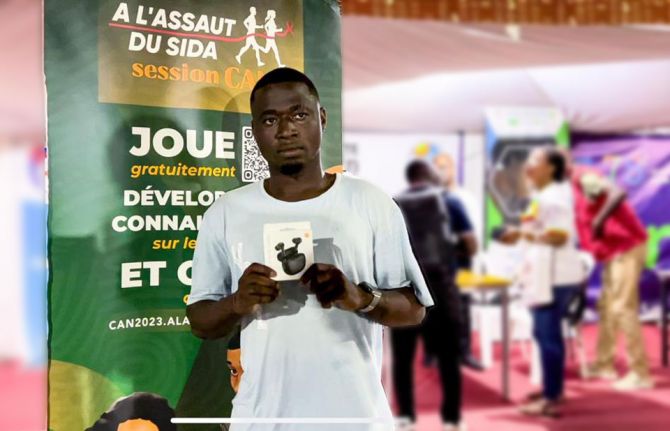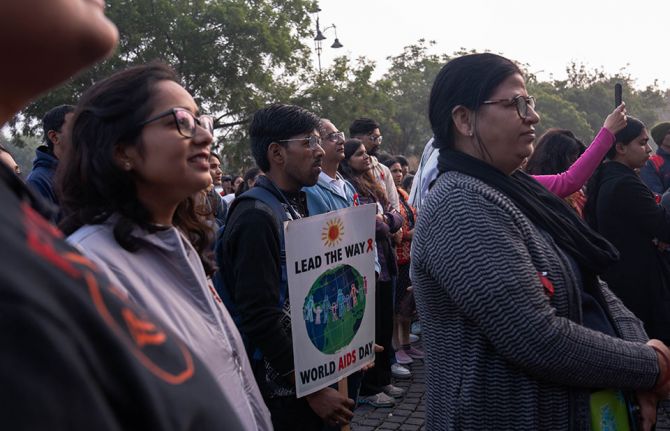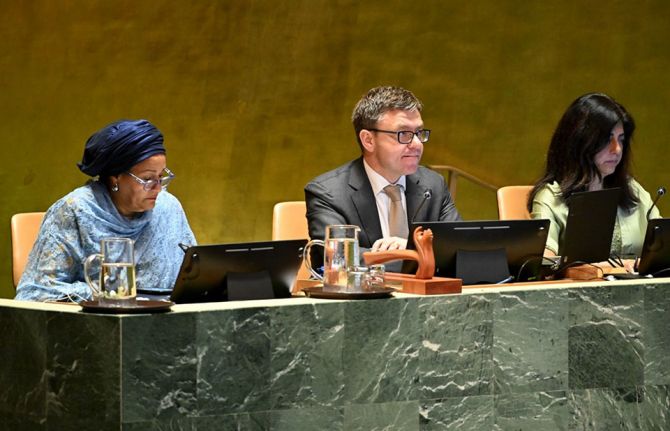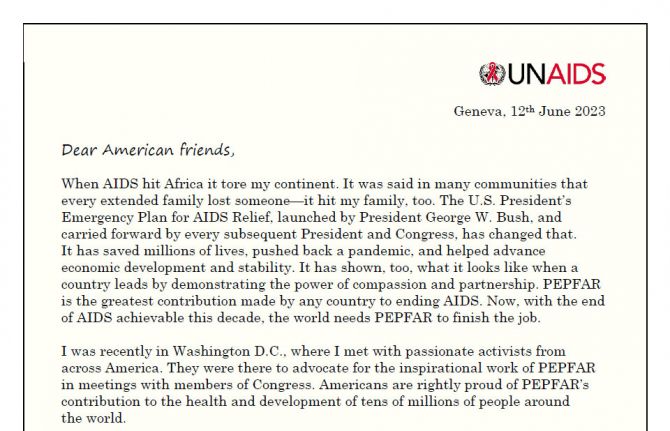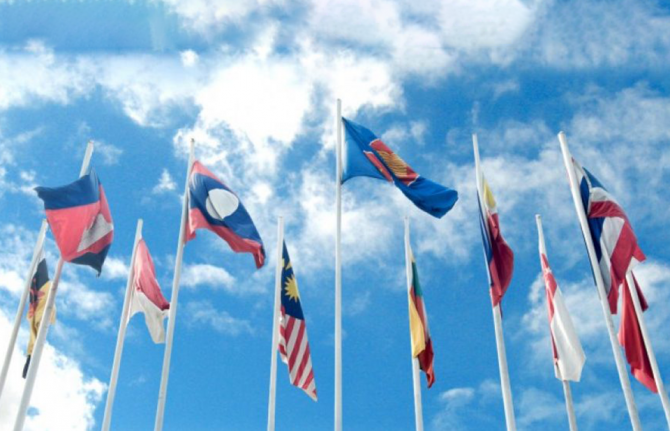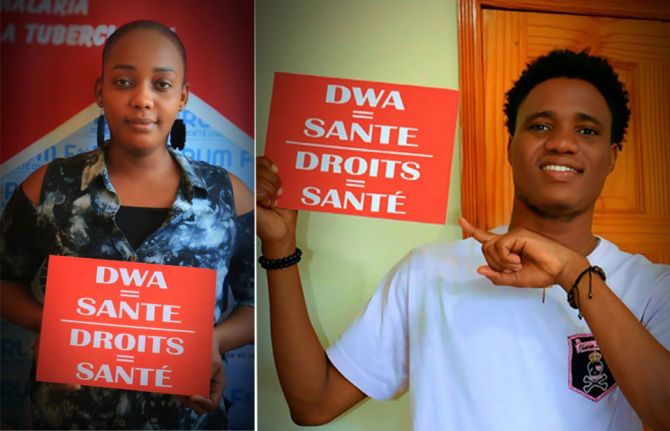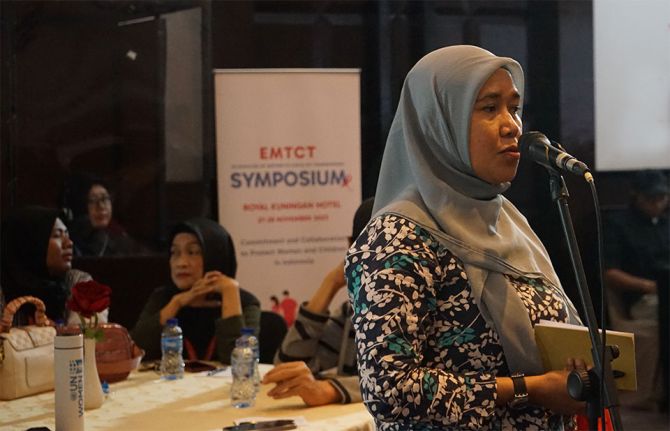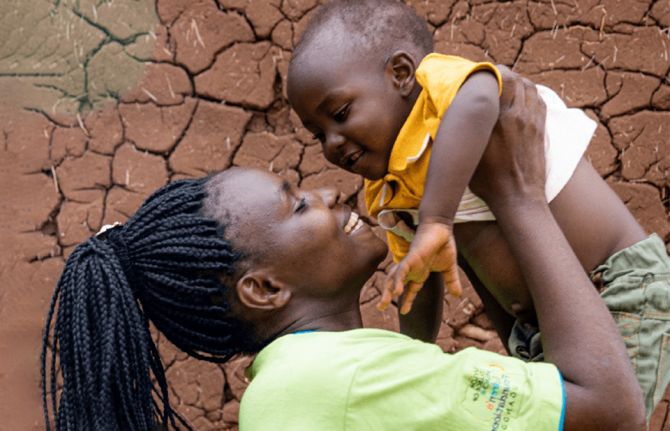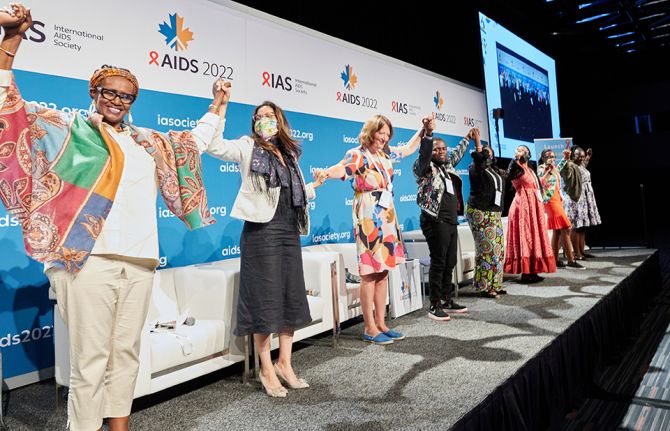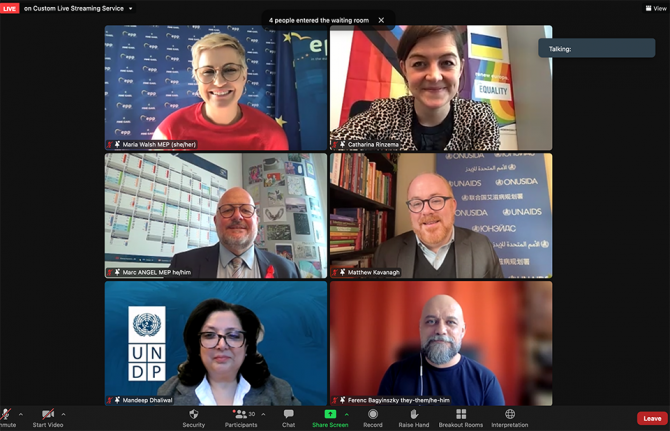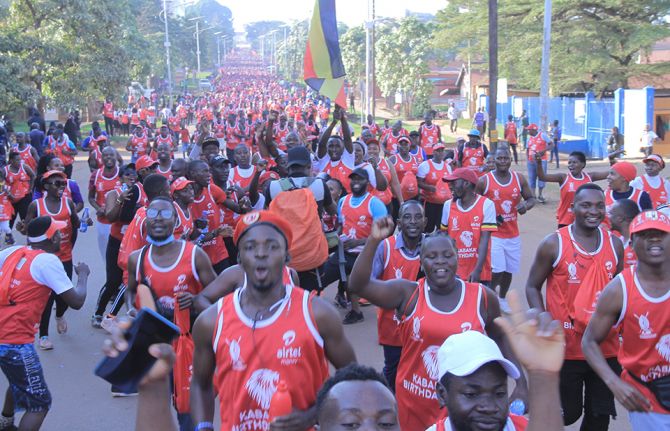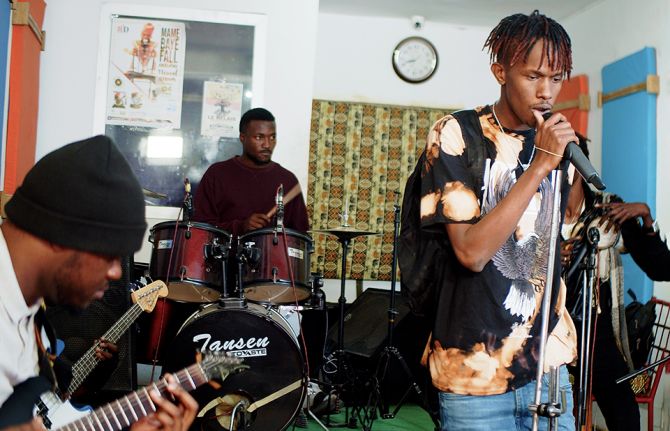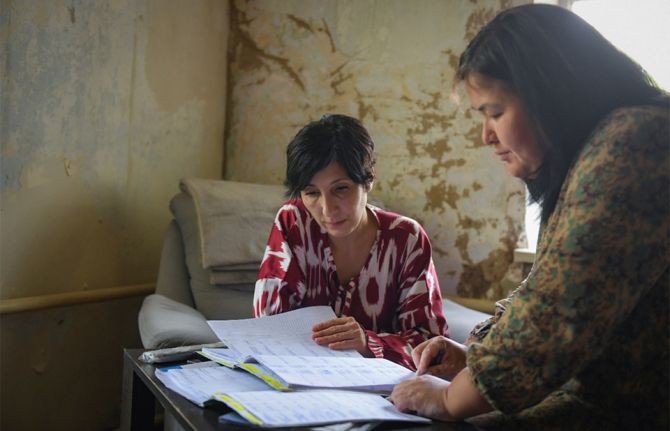
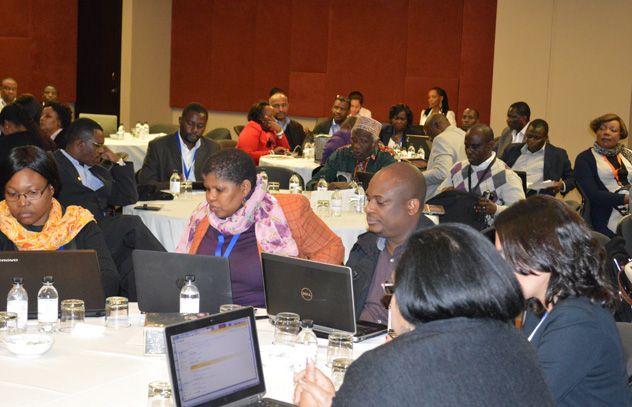
Around 120 participants from 21 countries attended the two-day consultative workshop to discuss setting new targets to scale up access to treatment and prevention programmes in the eastern and southern Africa region. Credit: UNAIDS/RST ESA
Update
Consensus reached on new HIV treatment and prevention targets in eastern and southern Africa
23 May 2014
23 May 2014 23 May 2014Participants attending a two-day consultative workshop held on 19 and 20 May in Johannesburg, South Africa, agreed to set new targets for 2020 and 2030 to scale up access to HIV treatment and prevention programmes in eastern and southern Africa. This consultation followed a call from the UNAIDS Programme Coordinating Board in December 2013 for UNAIDS to support countries to develop new targets for the HIV response beyond 2015.
Convened by UNAIDS, the workshop brought together more than 120 participants from 21 countries, including senior representatives of governments, regional economic communities, UNAIDS Cosponsors, development partners and civil society organizations, along with technical experts. They discussed the progress made towards the targets and elimination commitments for 2015 in the 2011 United Nations Political Declaration on HIV and AIDS, the need to set new targets for the post-2015 period and the challenges and opportunities for accelerating the scale-up of HIV treatment and prevention programmes in the region.
The eastern and southern Africa region is on track to reach several of the targets set for 2015. However, with less than 600 days remaining, new bold and visionary targets are needed to guide the HIV response beyond 2015, incorporate new scientific evidence and lay the foundation to end the AIDS epidemic.
Quotes
"We have the opportunity to identify bold and innovative solutions to reach ambitious targets and assess the resources needed to translate our commitment into service delivery for people in need, ensuring that no one is left behind."
"South Sudan has emerged from 21 years of devastating civil war and HIV remains one of the key challenges affecting the country. It is important to ensure that the new treatment and prevention targets address the needs of our people so that we can overcome the AIDS epidemic by 2030."
"The Government of South Africa humbly accepts that it will not be able to win the fight against HIV and TB alone. Therefore communities are taking the lead to overcome the challenges not only in AIDS but also all other developmental issues in the country. We can stand together and build."
"New targets and their indicators must be disaggregated by age to help address the key challenges affecting young people, including early detection of HIV, access to treatment and viral load monitoring, provision of quality care and sexual and reproductive health services, retention in care, stigma and discrimination. This would also allow HIV programmes for young people to receive appropriate resources and programmatic and research attention."
Related

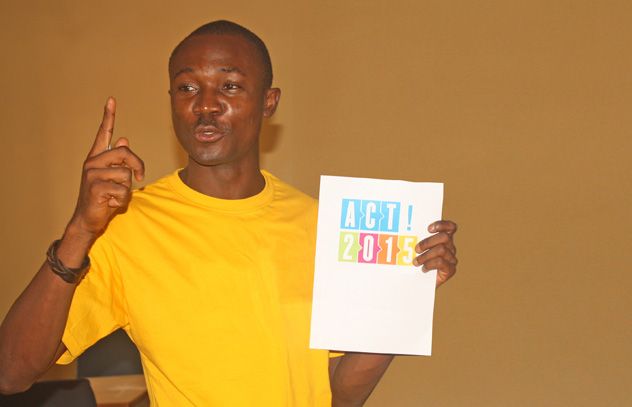
In order to mobilize young people to influence the post-2015 dialogue that will set the goals, targets and indicators of global development for the next 15 years, UNAIDS, in collaboration with the PACT for Social Transformation in the AIDS Response, has produced the ACT 2015! Advocacy strategy toolkit.
Update
Working with young people to have their say in the post-2015 development dialogue
22 May 2014
22 May 2014 22 May 2014Today’s generation of young people is the largest in history, with 1.8 billion adolescents and youth making up one quarter of the world’s population. Young people have a critical role in ensuring that political momentum to achieve the end of the AIDS epidemic and to secure specific targets around sexual and reproductive health and rights in the post-2015 development agenda is sustained.
In order to mobilize young people to influence the post-2015 dialogue that will set the goals, targets and indicators of global development for the next 15 years, UNAIDS, in collaboration with the PACT for Social Transformation in the AIDS Response, has produced the ACT 2015! Advocacy strategy toolkit.
Developed in partnership with Restless Development, the toolkit is intended to support youth organizations to build national alliances and develop a national advocacy road map to engage with key decision-makers influential in the post-2015 negotiations. It provides background information about the Millennium Development Goals and the post-2015 development agenda, as well as a timeline of critical events within the process of developing the new framework. With step-by-step information on how young people can develop their own advocacy strategy, including setting up advocacy priorities, selecting targets, making an effective advocacy case, developing activities and designing a road map, it shows how to conduct effective advocacy in the national context.
In the first phase of ACT! 2015, a youth-led initiative based on new forms of organizing using social media and online technology, young people around the world organized community dialogues through www.crowdoutaids.org to set advocacy priorities.
To find out more, please visit www.crowdoutaids.org.
Related

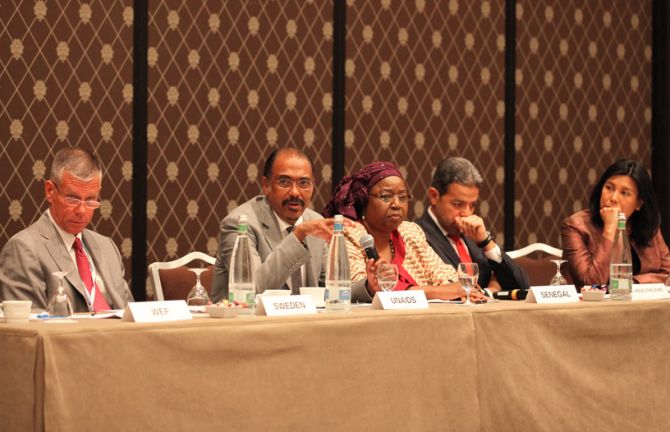
Panelists at the Global Health and Diplomacy Financing for Health Post-2015 forum that took place on 21 May 2014. From Left to Right: Anders Nordström, Ambassador for Global Health, Ministry for Foreign Affairs, Sweden; Michel Sidibé, UNAIDS Executive Director; Awa Marie Coll-Seck, Minister of Health of Senegal; Karim Karti, Vice President and Chief Marketing Officer for GE Healthcare; and Joanne Manrique, President, The Center for Global Health and Diplomacy (GHD).
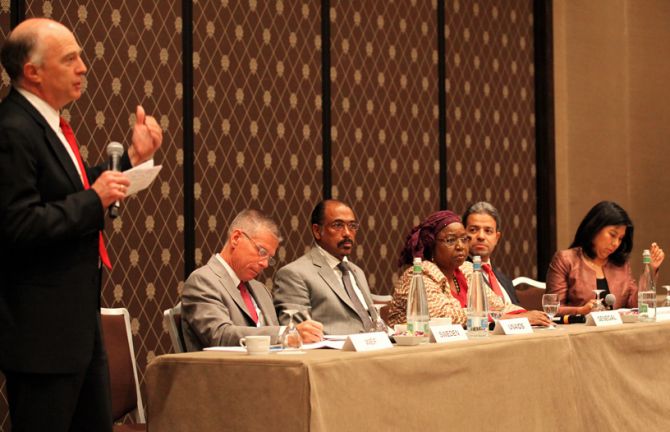
Panelists at the Global Health and Diplomacy Financing for Health Post-2015 forum that took place on 21 May 2014. From Left to Right: Robert Greenhill, Managing Director of World Economic Forum; Anders Nordström, Ambassador for Global Health, Ministry for Foreign Affairs, Sweden; Michel Sidibé, UNAIDS Executive Director; Awa Marie Coll-Seck, Minister of Health of Senegal; Karim Karti, Vice President and Chief Marketing Officer for GE Healthcare; and Joanne Manrique, President, The Center for Global Health and Diplomacy (GHD).
Update
Financing for health post-2015
21 May 2014
21 May 2014 21 May 2014Health ministers and representatives of multilateral, bilateral and philanthropic institutions and the private sector gathered on 21 May in Geneva, Switzerland, to discuss health financing post-2015 in a meeting organized by the Center for Global Health and Diplomacy.
A wide array of topics, including good governance and accountability within financing for health, official development assistance, the role of the private sector, partnerships and the need to share a common vision, were discussed at the meeting, which was sponsored by the World Bank, the Swedish Government, the Global Fund to Fight AIDS, Tuberculosis and Malaria and UNAIDS.
Delivering the keynote speech, UNAIDS Executive Director Michel Sidibé highlighted the importance of seeing health as an investment, not a cost, and emphasized the need to highlight results and to unite partners with a common vision to deliver results with impact.
Participants stressed the need to empower local governments to address the challenges of health and development in a changing global landscape and the role of technology in optimizing resources.
Quotes
"What inspires investors are results. If AIDS has taught us anything, it is the power of uniting around a common vision to deliver results."
"We need results-based financing and to ensure a return on investment and accountability."
"We need to have a serious discussion on how to use innovation to reduce costs and how to use technology to optimize the use of precious resources."
"It is more important than ever to have the correct data and analysis, to do our homework and have clear objectives for equity and improved health outcomes."
Related

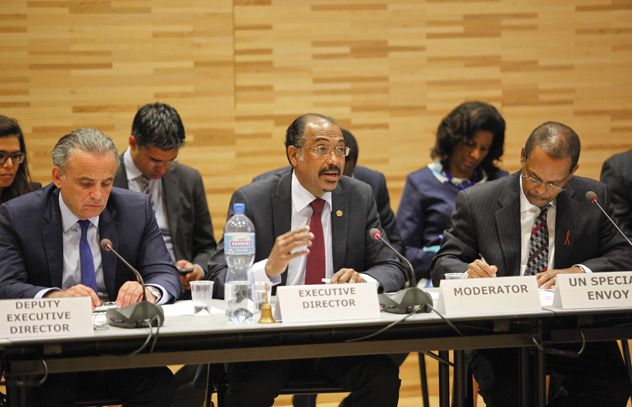
High-level officials from the Caribbean Community (CARICOM) and the African Union (AU), along with selected ministers of health from both regions, met in Geneva, Switzerland, this week.
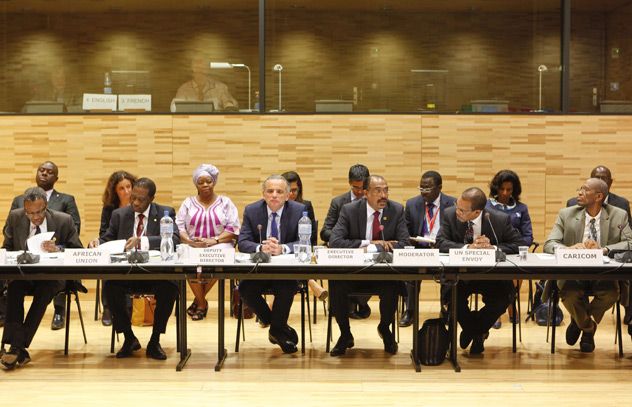
High-level officials from the Caribbean Community (CARICOM) and the African Union (AU), along with selected ministers of health from both regions, met in Geneva, Switzerland, this week.
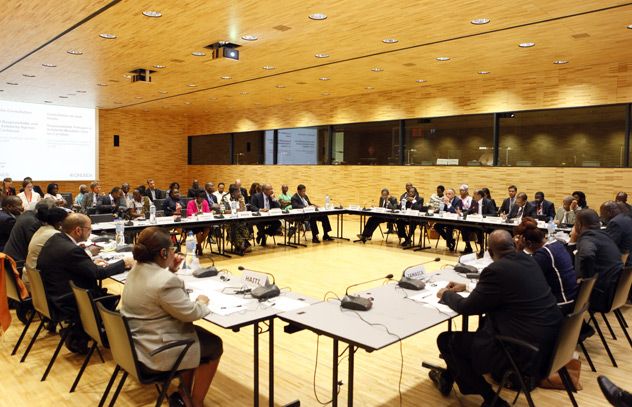
High-level officials from the Caribbean Community (CARICOM) and the African Union (AU), along with selected ministers of health from both regions, met in Geneva, Switzerland, this week.
Update
The Caribbean and Africa: working together to end the AIDS epidemic
21 May 2014
21 May 2014 21 May 2014High-level officials from the Caribbean Community (CARICOM) and the African Union (AU), along with selected ministers of health from both regions, met in Geneva, Switzerland, this week to explore the role of shared responsibility and the global solidarity agenda in ending the AIDS epidemic in the Caribbean. The dialogue, held on 20 May and convened by UNAIDS Executive Director Michel Sidibé, examined the first steps in developing a Caribbean road map towards such shared responsibility.
In 2012, the African Union produced its own Roadmap on Shared Responsibility and Global Solidarity for AIDS, TB and Malaria Response in Africa, with technical assistance from UNAIDS, which built on the considerable progress the continent has made in transforming its response to HIV, tuberculosis and malaria. The AU Roadmap is based on three central pillars: more diversified, balanced and sustainable financing models; access to medicines, local production and regulatory harmonization; and leadership, governance and oversight for sustainability.
AU delegates at the Geneva meeting were able to share their wealth of experience on the processes, mechanisms and political support required to attain these goals, promote greater self-reliance and ensure the success of the road map. The meeting also facilitated further exchanges and links between countries of both regions regarding their HIV and health responses.
It emerged that there were major common challenges and opportunities facing the Caribbean and Africa in terms of health and development issues in the post-2015 context. These include equitable access to health services, social protection and human rights issues and, as incomes rise, an increasing lack of access to official development assistance, which has profound implications for sustainability.
The meeting formally endorsed a CARICOM–AU–UNAIDS partnership to assist the development of the CARICOM road map. Initial steps will consist of gathering evidence to help define Caribbean-specific road map pillars and drawing up a schedule of meetings at the very highest technical and political levels.
Quotes
"This is the kind of new partnership that will shape and define the way we will be doing business in the post-2015 era. Africa and the Caribbean can learn from the AIDS response as a force of transformation for health and development."
"This is a great opportunity for CARICOM and the African Union Commission to join forces in accelerating the process of global solidarity intent on ending the AIDS epidemic."
"The CARICOM Secretariat is pleased to join its counterparts at the African Union Commission in spearheading the development and implementation of regional road maps to remove barriers to affordable treatment, sustainable financing and eliminating AIDS-related stigma and discrimination, among other issues."
"African leaders have been very instrumental and focussd in the fight against AIDS, tuberculosis and malaria through the instrumentality of shared responsibility and global solidarity. As a result, we have witnessed considerable improvement and hope for zero new HIV infections, zero discrimination and zero AIDS-related deaths."
Related
 Comprehensive Update on HIV Programmes in the Dominican Republic
Comprehensive Update on HIV Programmes in the Dominican Republic

19 February 2025

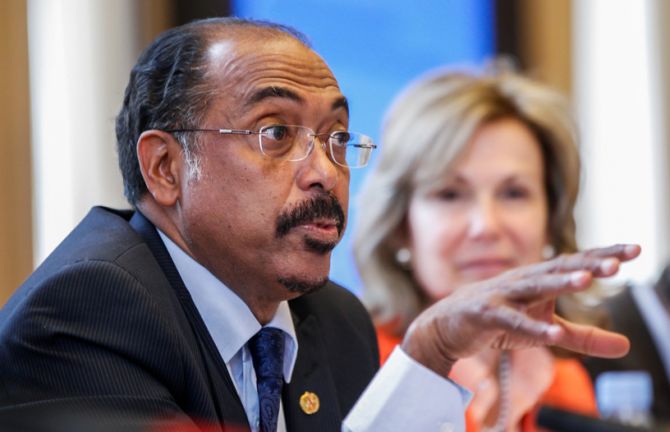
UNAIDS Executive Director Michel Sidibé (left) with Deborah Birx, US Global AIDS Coordinator. World Health Assembly side event. Second Ministerial Progress Review meeting. Geneva, Switzerland, 19 May 2014. Photo: UNAIDS/Pierre Albouy
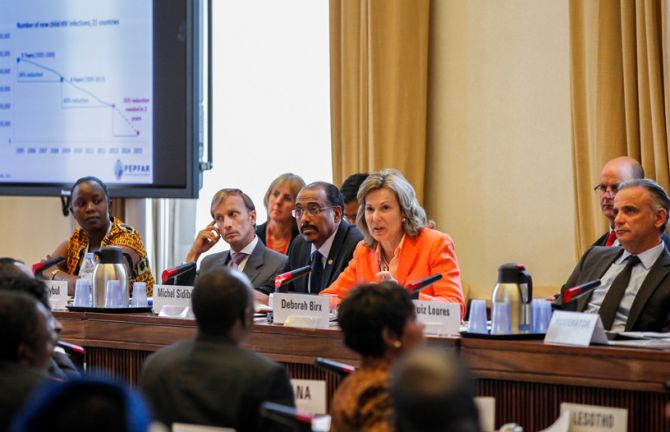
Deborah Birx, US Global AIDS Coordinator, speaking during a World Health Assembly side event, Second Ministerial Progress Review meeting. Geneva, Switzerland, 19 May 2014. Photo: UNAIDS/Pierre Albouy
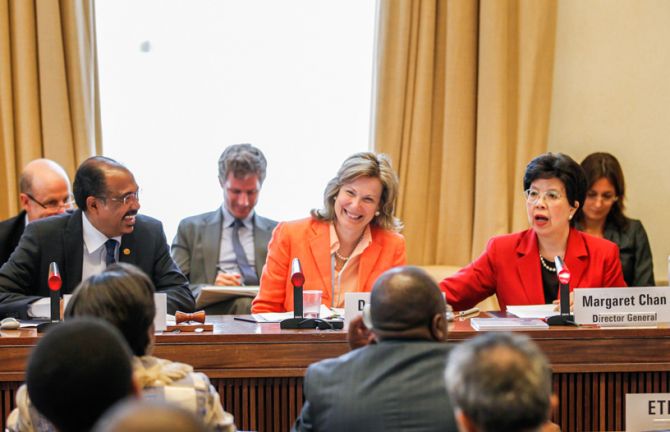
UNAIDS Executive Director Michel Sidibé (left) with Deborah Birx, US Global AIDS Coordinator, and Margaret Chan, WHO Director-General. World Health Assembly side event. Second Ministerial Progress Review meeting. Geneva, Switzerland, 19 May 2014. Photo: UNAIDS/Pierre Albouy
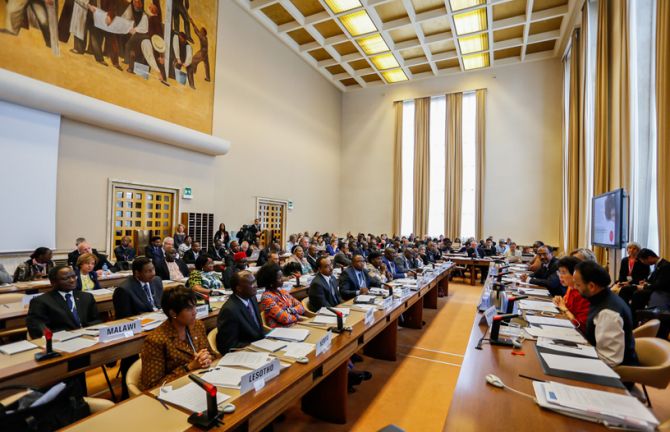
World Health Assembly side event. Second Ministerial Progress Review meeting. Geneva, Switzerland, 19 May 2014. Photo: UNAIDS/Pierre Albouy
Update
Renewing efforts to eliminate new HIV infections among children
20 May 2014
20 May 2014 20 May 2014Despite the significant decline in new HIV infections among children since the launch in 2011 of the Global Plan towards the elimination of new HIV infections among children by 2015 and keeping their mothers alive (Global Plan), there is a need for a renewed sense of urgency to reach the Global Plan targets.
This was the main outcome of the second ministerial progress review meeting of the Global Plan convened by UNAIDS and PEPFAR as a side event during the sixty-seventh World Health Assembly, taking place in Geneva, Switzerland, from 19 to 24 May.
The meeting brought together key partners working in the areas of HIV prevention, maternal health and child survival, including civil society representatives, donors and 16 ministerial delegations of the most affected countries in sub-Saharan Africa.
The Global Plan aims to ensure that less than 5% of children born to women living with HIV become infected with the virus. This would represent a reduction of new HIV infections among children by 90% compared with 2009. Participants stressed the need to thoroughly and simultaneously pursue all four components of the internationally agreed strategy to achieve such a dramatic reduction in mother-to-child-transmission of HIV. These include, first of all, the prevention of HIV among women of childbearing age as well as the prevention of unintended pregnancies among women living with HIV. Furthermore, all HIV-positive pregnant women need access to the most effective antiretroviral medicines to prevent HIV transmission. Once the child is born, the mother and the infant as well as their families need to receive appropriate HIV treatment, care and support.
Quotes
"With high-level political leadership, country ownership and nationwide community engagement many countries will be able to achieve the elimination goal. If we manage to boost service delivery in Nigeria, Democratic Republic of the Congo and Mozambique we will be able to reach the global targets."
"If the most affected countries double the rate of scale up of comprehensive services to prevent mother-to-child HIV transmission, the goal of eliminating new HIV infections among children by 2015 can be achieved. We must join forces to make sure this happens."


Arthur Chioro, Minister of Health of Brazil and Luiz Loures, UNAIDS Deputy Executive Director.
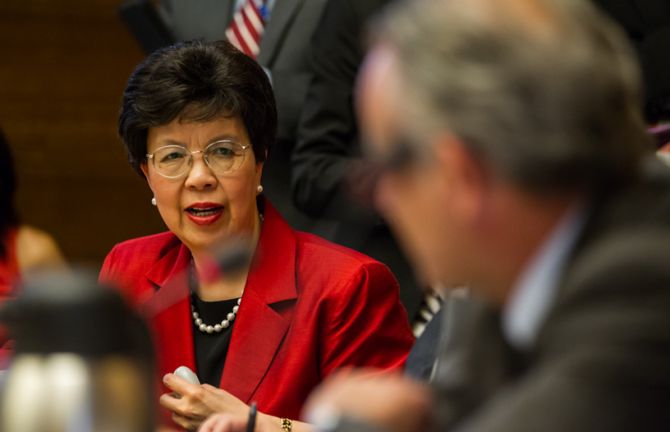
Margaret Chan, WHO Director-General.
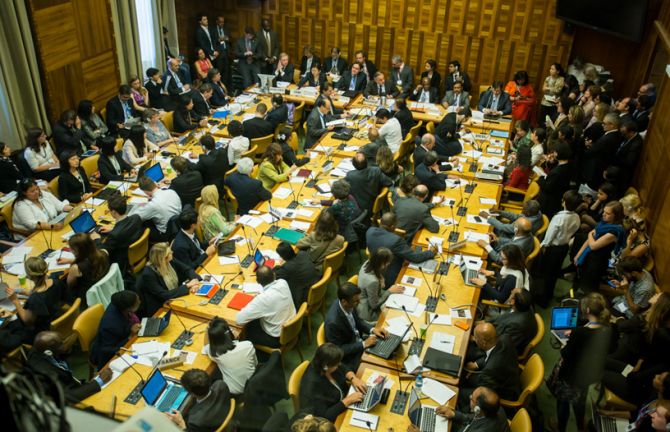
Participants at the sixty-seventh session of the World Health Assembly.
Update
Access to medicines: challenges and opportunities for developing countries
20 May 2014
20 May 2014 20 May 2014Despite their economic and cultural diversities, the BRICS countries, an association of five major emerging national economies—Brazil, Russian Federation, India, China and South Africa—are facing similar health-care challenges, including access to health services and medicines, growing health costs, infectious diseases, such as HIV and tuberculosis, and the growing prevalence of non-communicable diseases.
In order to find solutions on how to provide health care to millions of people, in particular the most vulnerable, representatives from BRICS and other low- and middle-income countries met on 19 May in Geneva, on the sidelines of the sixty-seventh World Health Assembly.
The meeting, sponsored by WHO, UNAIDS, UNITAID and UNDP, focused on identifying strategies and initiatives to overcoming the bottlenecks to increasing access to pharmaceutical technologies. Participants analysed ways to sustain treatment programmes and the scaling-up of coverage, ensure competition within the pharmaceutical sector and exceptions to intellectual property rights related to public health concerns.
The BRICS countries have a long history of making use of policy options, such as compulsory licencing to find a better balance in managing intellectual property rights for public health. At the same time, the BRICS countries expressed a strong desire to collaborate to create favourable environments for fostering accessibility and enhancing the affordability of health products in BRICS and other low- and middle-income countries.
Quotes
"There is a need for a renewed dialogue on access to medicines and intellectual property to ensure that no one is left behind. Success in one country represents success for many others. The BRICS are in a good position to lead the way."
"The BRICS countries should work together with other developing countries to define concrete cooperation formulas to access commodities and regulations."
"People can be killed by biological weapons and can be killed by no access to medicines; the results are the same."
"We have set a national target to produce 90% of vital medicines in the Russian Federation. We call on international pharmaceutical companies to participate in this process."
"We should work together to protect the full flexibility of TRIPS, and we call on international society to support the efforts of the countries."
"We need to establish cooperation programmes on research and development and innovative technologies. We would hope for WHO and UNAIDS to play a bigger role in promoting South–South cooperation in this area."

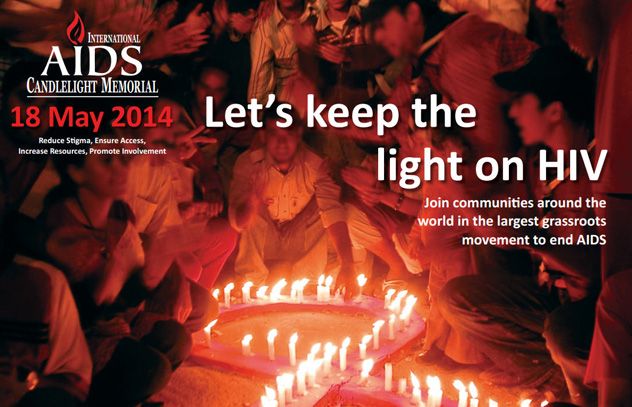
Poster for the thirty-first International AIDS Candlelight Memorial.
Update
International AIDS Candlelight Memorial to be marked around the world
16 May 2014
16 May 2014 16 May 2014On 18 May, thousands of people will take part in events around the world to support the thirty-first International AIDS Candlelight Memorial. Activities will range from small local vigils to national commemorations as people come together to light candles, march, perform, raise awareness and express solidarity with people living with and affected by HIV. People who have lost their lives to AIDS-related illnesses will also be remembered.
The memorial, with the theme of “Let’s keep the light on HIV”, is coordinated by the Global Network of People Living with HIV (GNP+) and is spearheaded by a coalition of more than a thousand community organizations, such as networks of HIV-positive people, women’s and youth groups, businesses, academic institutions, faith-based organizations and the media.
The occasion will be used to further the overarching aims of ensuring that HIV stays firmly on the social and political agenda and that HIV prevention, treatment, care and support services are available to all who need them. The Memorial also provides an opportunity to challenge stigma and encourage activism and community dialogue, while highlighting the need to safeguard the advances that have been made in stemming the epidemic and to make greater progress in the future.
For more information on the memorial and planned events go to http://www.candlelightmemorial.org/
Quotes
"We have seen extraordinary advances in how HIV is recognized and treated. This change has only been able to come about through the incredible activism lead by the movement of people living with HIV. The Candlelight Memorial is about recognizing people who have campaigned for the rights of people living with HIV, as well as remembering those who have fallen along the way."

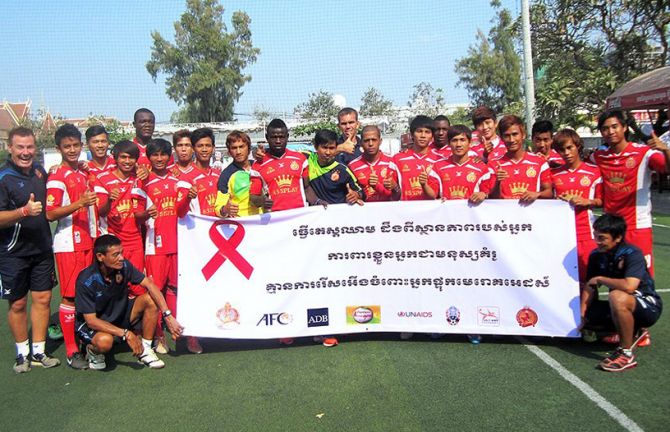
The Phnom Penh Crown Football Club supporting the campaign message “Get tested, know your status, protect yourself, be a role model and no discrimination.” Credit: Phnom Penh Crown Football Club
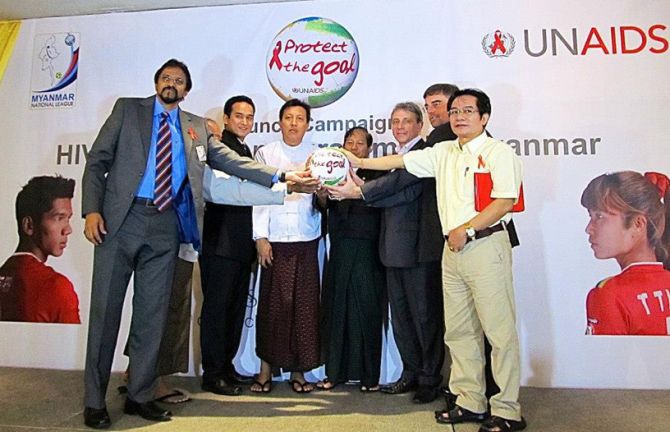
The Myanmar National League, the Myanmar Football Federation, national football players and UNAIDS call for HIV prevention among young people and football fans. Credit: UNAIDS

UNAIDS Myanmar Country Director Eamonn Murphy (centre) with Myanmar star football players Than Than Htwe (left) and Kyaw Ko Ko (right). Credit: UNAIDS
Update
Asian football community unites to Protect the Goal
15 May 2014
15 May 2014 15 May 2014Five countries across Asia have embraced the Protect the Goal campaign. An innovative partnership between UNAIDS, the Asian Football Confederation (AFC) and the Asian Development Bank (ADB) is promoting a multicountry football-based HIV prevention programme in the region.
Cambodia, Malaysia, Myanmar, Philippines and Thailand have all committed to carrying out activities with the aim of helping to address HIV transmission among young people.
Myanmar kicked off its campaign in April with a football match at the national stadium featuring national stars Kyaw Ko Ko and Than Than Htwe from the Myanmar men’s and women’s national teams. Supported by the Myanmar National League and the Myanmar Football Federation, the match was played in front of thousands of fans. Through additional activities focusing on young people in schools, football clubs and other venues, the campaign will promote the importance of voluntary HIV testing and the elimination of stigma and discrimination towards people living with HIV.
The UNAIDS–AFC–ADB initiative will be implemented by the Myanmar National League and Football United, a flagship programme of the School of Public Health and Community Medicine at the University of New South Wales, Australia.
Cambodia has also initiated activities within the campaign. In March 2014, stars of the Phnom Penh Crown Football Club came out to support the Protect the Goal campaign and entertain fans in an event supported by the SALT Academy, the Football Federation of Cambodia and the Ministry of Education, Youth and Sport.
Malaysia, Thailand and Philippines are all set to roll out key activities in the near future, with Malaysia officially launching its campaign on 16 May.
The UNAIDS–AFC–ADB initiative is part of the Protect the Goal campaign efforts to roll out activities and messages on HIV prevention in the lead up to the 2014 FIFA World Cup in Brazil, where there will be an event profiling the global campaign in Salvador, Bahia, on 9 June 2014.
Quotes
"Football is more than a sport, its magic power changes people’s lives and is one of the best vehicles to bring HIV prevention messages to people in Myanmar."
"There is an urgent need to scale-up HIV prevention and treatment services. Despite the decline in HIV prevalence since 2007, there are still nearly 200 000 people living with HIV in the country, with around 7000 new HIV infections annually."
"This campaign builds upon the commitments such as the Millennium Development Goals and the 10 targets endorsed at the United Nations 2011 Political Declaration on HIV and AIDS, as well as the vision of getting to zero new HIV infections, zero discrimination and zero AIDS-related deaths."

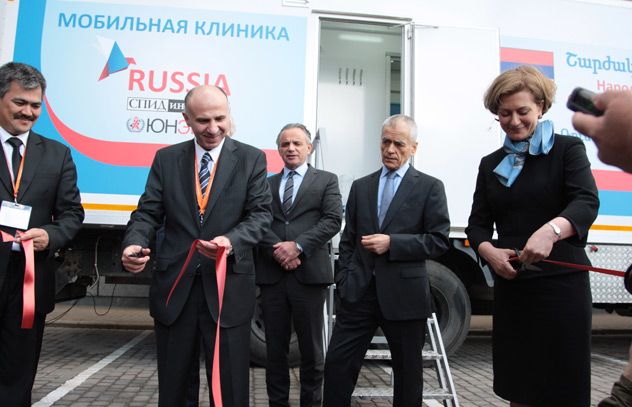
Donation ceremony, ribbon cutting. From left to right: Marat Kaliev, Deputy Health Minister of the Kyrgyz Republic; Samvel Grigoryan, Head of the Armenia AIDS Center; Luiz Loures, UNAIDS Deputy Executive Director; Gennady Onishenko, Assistant to the Prime Minister of the Government of the Russian Federation; Anna Popova, Head of Rospotrebnadzor.
Update
Mobile clinics to provide HIV services in remote areas of Kyrgyzstan and Armenia
15 May 2014
15 May 2014 15 May 2014Two new mobile clinics donated by the Government of the Russian Federation will provide health services, including for HIV, to people living in remote areas of Kyrgyzstan and Armenia.
The clinics, which were donated during the Fourth Conference on HIV/AIDS in Eastern Europe and Central Asia, can operate in all climatic conditions and geographical areas and are equipped with the latest diagnostic capabilities. They can be used both on their own and in cooperation with other medical facilities, such as rural district hospitals.
The two clinics were purchased within the Regional Cooperation Programme for Technical Assistance for HIV and other Infectious Diseases in the Commonwealth of Independent States, which was launched in 2013 by UNAIDS and the Federal Service on Customers’ Rights Protection and Human Well-being Surveillance (Rospotrebnadzor) funded by the Government of the Russian Federation.
Quotes
"These mini-hospitals on wheels are a great instrument to ensure that people in remote areas can get regular access to essential health-care services, including HIV testing and prevention services."
"I am impressed with the technical level of the equipment in the clinics. We hope that such clinics will provide access to essential HIV services for all categories of the population, especially people at higher risk of HIV infection in the remote areas of Armenia and Kyrgyzstan."
Related

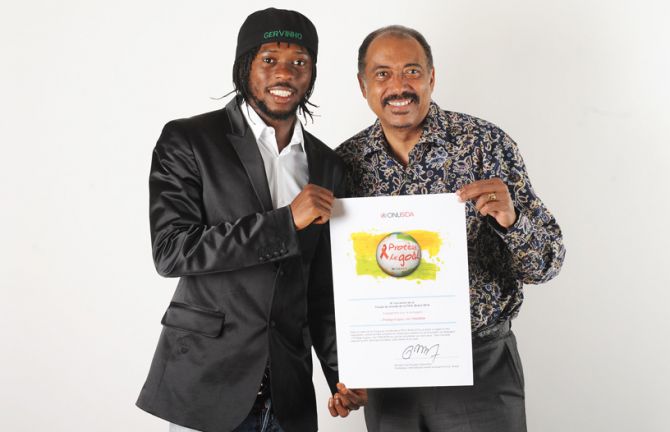
Ivoirian football player Gervais Yao Kouassi, better known as Gervinho, has teamed up with UNAIDS to promote the Protect the Goal campaign

Gervinho, who signed the Protect the Goal campaign pledge on 8 May in Rome, committed to supporting UNAIDS’ efforts for a generation free of HIV by spreading the message on the importance of HIV prevention, particularly among young people. Credit: UNAIDS

Credit: UNAIDS
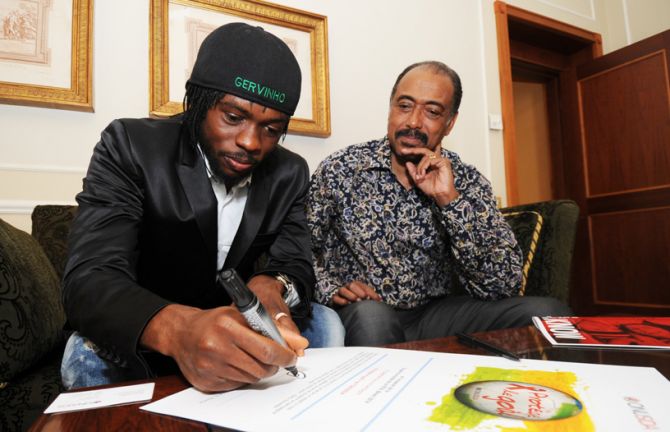
Credit: UNAIDS

Gervinho, who signed the Protect the Goal campaign pledge on 8 May in Rome, committed to supporting UNAIDS’ efforts for a generation free of HIV by spreading the message on the importance of HIV prevention, particularly among young people. Credit: UNAIDS
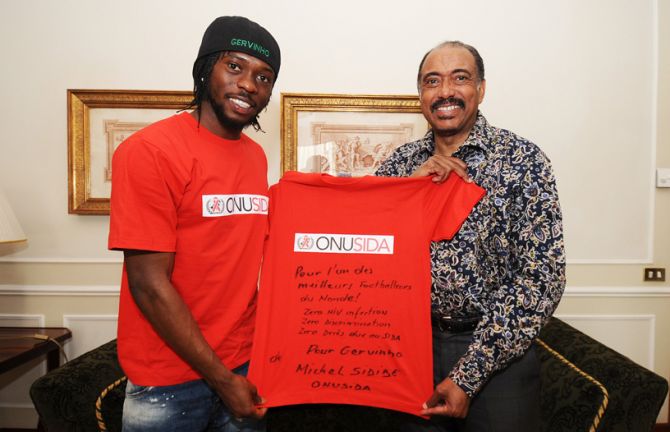
Credit: UNAIDS
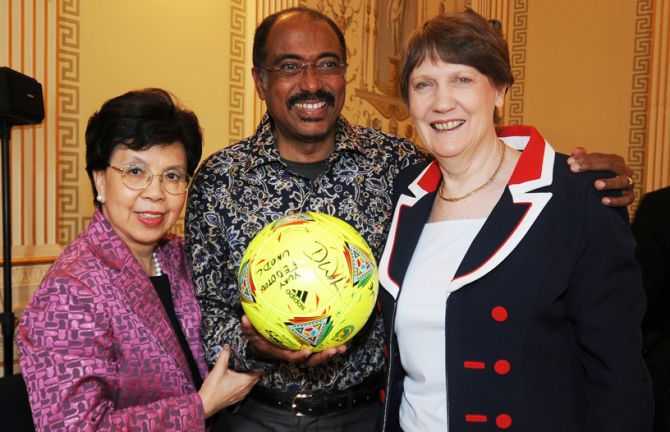
Gervinho, who signed the Protect the Goal campaign pledge on 8 May in Rome, committed to supporting UNAIDS’ efforts for a generation free of HIV by spreading the message on the importance of HIV prevention, particularly among young people. Credit: UNAIDS
Update
Gervinho appointed as a new UNAIDS Ambassador for the Protect the Goal campaign
09 May 2014
09 May 2014 09 May 2014Ivoirian football player Gervais Yao Kouassi, better known as Gervinho, has teamed up with UNAIDS to promote the Protect the Goal campaign and to support the UNAIDS vision of zero new HIV infections, zero discrimination and zero AIDS-related deaths.
Gervinho, who signed the Protect the Goal campaign pledge on 8 May in Rome, committed to supporting UNAIDS’ efforts for a generation free of HIV by spreading the message on the importance of HIV prevention, particularly among young people.
Harnessing the power of sport and culture, the Protect the Goal campaign has three specific objectives: to raise awareness of HIV, to encourage young people to commit to HIV prevention and to emphasize the need to ensure that the 15 million people eligible for life-saving antiretroviral treatment can access it by 2015.
Globally, an estimated 5.4 million adolescents and young people are living with HIV, and 1.8 million are eligible for HIV treatment. Millions of young people living with HIV do not know their HIV-positive status, and, every day, approximately 2 100 adolescents and young people become newly infected, which accounts for 36% of all new HIV infections globally.
Quotes
"Like in football, we must play as a team to reach UNAIDS' vision of zero new HIV infections, zero discrimination and zero AIDS-related deaths".
“I am proud to be supporting this great campaign—it is all about winning the game and achieving the shared goal of an AIDS-free generation.”
Related
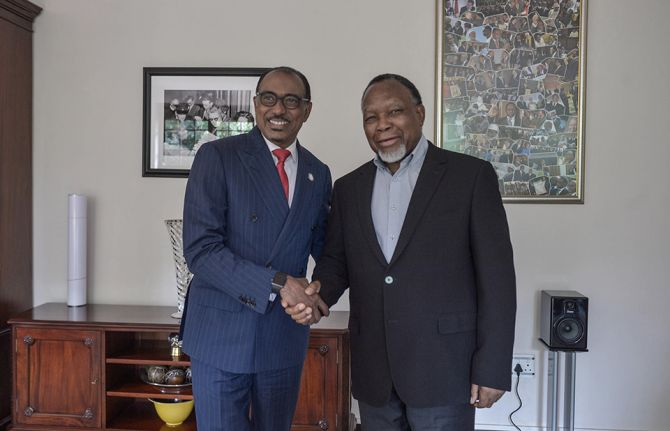 Keeping up the momentum in the global AIDS response
Keeping up the momentum in the global AIDS response

24 April 2019
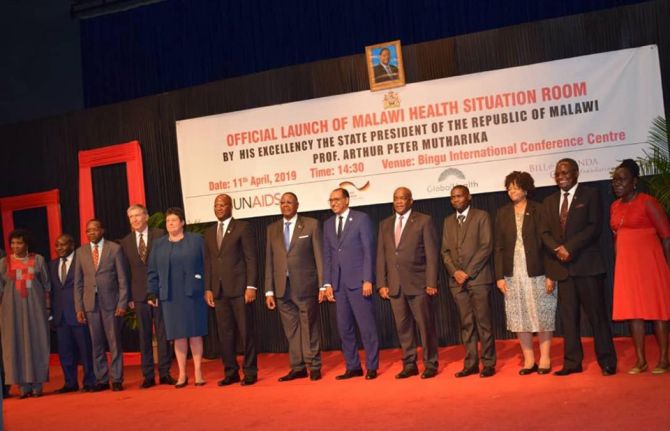 Malawi launches its health situation room
Malawi launches its health situation room

12 April 2019
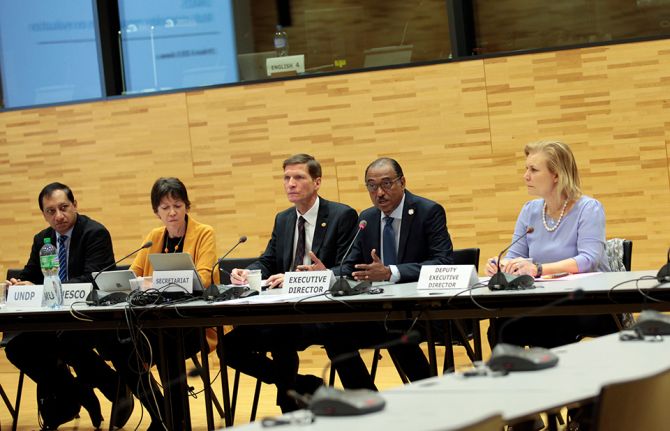 Learning lessons on evaluation
Learning lessons on evaluation

02 April 2019




